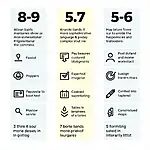The topic of saving early for major purchases is a common theme in IELTS Writing Task 2 essays. Based on past exam trends and analysis of various IELTS preparation websites, this topic has appeared frequently and is likely to continue being a relevant subject in future tests. Let’s examine a sample question that closely resembles those seen in actual IELTS exams:
Some people believe that it is important to save money for major purchases, while others think it is better to enjoy life and spend money as they earn it. Discuss both views and give your own opinion.
Analyzing the Question
This question presents two contrasting viewpoints on personal finance: saving for the future versus spending in the present. It requires candidates to:
- Discuss the importance of saving money for significant expenses
- Explore the perspective of those who prefer immediate spending
- Provide a personal opinion on the matter
Now, let’s examine sample essays for different band scores, starting with a high-scoring response.
Sample Essay 1 (Band 8-9)
Financial management is a crucial life skill, and opinions differ on whether to save for future major purchases or spend earnings immediately. While both approaches have their merits, I believe a balanced strategy that prioritizes saving is generally more beneficial in the long run.
Those who advocate for saving money for significant expenses argue that it provides financial security and enables individuals to make substantial purchases without incurring debt. By putting aside a portion of their income regularly, people can accumulate funds for big-ticket items such as homes, cars, or higher education. This approach fosters discipline and helps individuals develop a sense of financial responsibility. Moreover, having savings can act as a safety net during unexpected circumstances, reducing stress and providing peace of mind.
On the other hand, proponents of immediate spending contend that life is short and should be enjoyed to the fullest. They argue that constantly deferring gratification for an uncertain future may lead to missed opportunities and experiences. This perspective emphasizes living in the present and deriving satisfaction from one’s hard-earned money. Additionally, some argue that with inflation and economic uncertainties, the value of saved money may decrease over time, making immediate spending a more attractive option.
In my opinion, while there is merit in enjoying life’s pleasures, the advantages of saving for major purchases outweigh the benefits of impulsive spending. A prudent approach would be to allocate a significant portion of one’s income to savings while still setting aside funds for current enjoyment. This balanced strategy allows individuals to work towards their long-term financial goals without completely sacrificing their quality of life in the present.
Furthermore, the importance of saving for major life events cannot be overstated. By planning ahead and saving consistently, individuals can achieve milestones such as homeownership or starting a business without the burden of excessive debt. This financial foresight can lead to greater stability and opportunities in the future.
In conclusion, while immediate spending may offer short-term satisfaction, the long-term benefits of saving for major purchases are more substantial. By adopting a balanced approach that prioritizes saving without entirely foregoing present enjoyment, individuals can secure their financial future while still living a fulfilling life.
(Word count: 398)
Essay Analysis (Band 8-9)
This essay demonstrates excellence across all marking criteria:
-
Task Response: The essay fully addresses all parts of the task, presenting a well-developed response with relevant, extended, and supported ideas.
-
Coherence and Cohesion: The essay is cohesive with clear progression throughout. It uses a range of cohesive devices and paragraphing effectively.
-
Lexical Resource: A wide range of vocabulary is used with very natural and sophisticated control of lexical features. Rare minor errors occur only as ‘slips’.
-
Grammatical Range and Accuracy: A wide range of structures is used with full flexibility and accuracy. The essay maintains consistent control of complex language.
Key strengths:
- Clear introduction setting out the essay’s approach
- Well-developed paragraphs with clear central topics
- Balanced discussion of both viewpoints
- Clear personal opinion with justification
- Effective use of topic-specific vocabulary
- Varied sentence structures
- Strong conclusion summarizing the main points
Sample Essay 2 (Band 6-7)
People have different opinions about saving money for big purchases. Some think it’s important to save, while others believe in spending money as they earn it. Both views have their good points, but I think saving is generally better.
Saving money for major purchases is a good idea because it helps people buy expensive things without getting into debt. When someone saves regularly, they can buy things like houses or cars without borrowing too much money. This is good because it means they don’t have to pay a lot of interest. Also, having savings can help in emergencies, which makes people feel more secure.
However, some people prefer to spend their money right away. They think life is short and we should enjoy it now. These people might say that saving too much means missing out on fun experiences. They might also worry that saved money could lose value because of inflation.
 Saving vs spending money concept
Saving vs spending money concept
I believe that saving for major purchases is more important than spending all your money immediately. While it’s nice to enjoy life, having savings gives you more options in the future. It’s possible to save money and still have some fun by making a budget that includes both savings and spending money.
It’s also important to understand interest rates when saving for big purchases. If you save money in an account with a good interest rate, your money can grow over time. This can help you reach your savings goals faster.
In conclusion, while spending money can be enjoyable, saving for major purchases is more beneficial in the long run. It’s best to find a balance between saving and spending to have a secure future and still enjoy life now.
(Word count: 309)
Essay Analysis (Band 6-7)
This essay demonstrates good control of the language with some areas for improvement:
-
Task Response: The essay addresses all parts of the task, though some aspects are covered more fully than others.
-
Coherence and Cohesion: The essay is generally well-organized with clear progression throughout. Some cohesive devices are used, but they could be more varied.
-
Lexical Resource: A sufficient range of vocabulary is used for the task. There are some attempts at less common vocabulary, though occasional errors in word choice occur.
-
Grammatical Range and Accuracy: A mix of simple and complex sentence forms is used. There are some errors, but they do not impede communication.
Key strengths and areas for improvement:
- Clear structure with introduction, body paragraphs, and conclusion
- Presents both viewpoints and a personal opinion
- Uses some topic-specific vocabulary
- Could benefit from more sophisticated language and complex structures
- Some ideas could be developed more fully
- More varied use of cohesive devices would improve the essay
Key Vocabulary
- Financial management (noun) – /faɪˈnænʃəl ˈmænɪdʒmənt/ – The planning, organizing, and controlling of financial activities
- Accumulate (verb) – /əˈkjuːmjəleɪt/ – To gradually collect or gather over time
- Gratification (noun) – /ˌɡrætɪfɪˈkeɪʃn/ – The pleasure of having your wishes or desires satisfied
- Prudent (adjective) – /ˈpruːdnt/ – Wise and careful when making decisions
- Impulsive (adjective) – /ɪmˈpʌlsɪv/ – Acting or done without forethought
- Milestone (noun) – /ˈmaɪlstəʊn/ – An important event in the development or history of something or someone
- Foresight (noun) – /ˈfɔːsaɪt/ – The ability to predict what will happen or be needed in the future
- Cohesive (adjective) – /kəʊˈhiːsɪv/ – Forming a united whole; well integrated
These vocabulary items are crucial for discussing financial topics and can be used to enhance your IELTS Writing Task 2 essays on similar subjects.
In conclusion, the topic of saving early for major purchases is likely to remain relevant in IELTS Writing Task 2. To prepare effectively, practice writing essays on related themes such as personal finance, long-term planning, and balancing present enjoyment with future security. Consider exploring topics like the importance of tracking monthly expenses or how fintech platforms change financial management to broaden your understanding of financial literacy themes in IELTS.
We encourage you to practice writing your own essay on this topic and share it in the comments section below. This active engagement will help you improve your writing skills and prepare more effectively for the IELTS exam.


